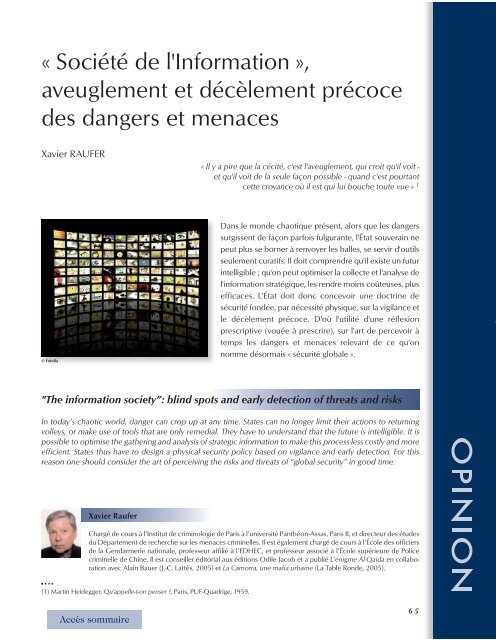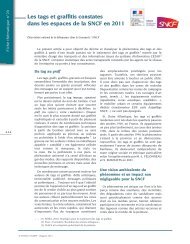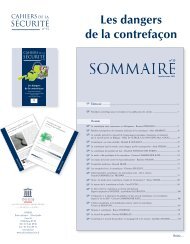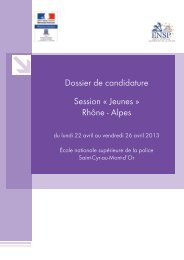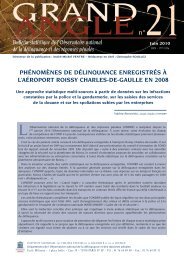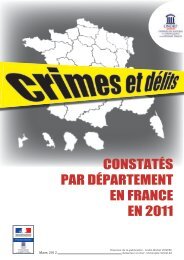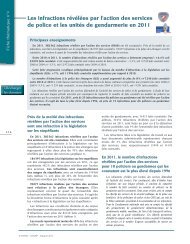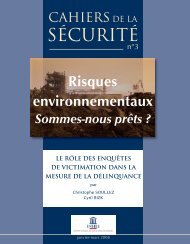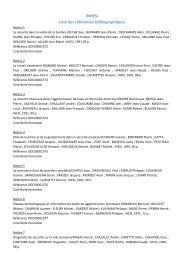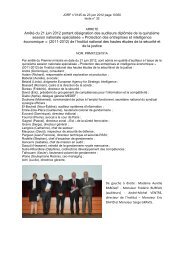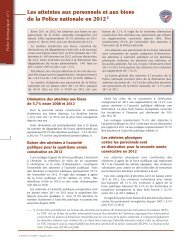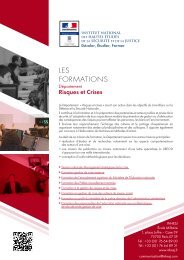Capacités d'absorption et gestion de crise - inhesj
Capacités d'absorption et gestion de crise - inhesj
Capacités d'absorption et gestion de crise - inhesj
Create successful ePaper yourself
Turn your PDF publications into a flip-book with our unique Google optimized e-Paper software.
« Société <strong>de</strong> l'Information »,<br />
aveuglement <strong>et</strong> décèlement précoce<br />
<strong>de</strong>s dangers <strong>et</strong> menaces<br />
Xavier RAUFER<br />
« Il y a pire que la cécité, c'est l'aveuglement, qui croit qu'il voit -<br />
<strong>et</strong> qu'il voit <strong>de</strong> la seule façon possible - quand c'est pourtant<br />
c<strong>et</strong>te croyance où il est qui lui bouche toute vue » 1<br />
© Fotolia<br />
Dans le mon<strong>de</strong> chaotique présent, alors que les dangers<br />
surgissent <strong>de</strong> façon parfois fulgurante, l'État souverain ne<br />
peut plus se borner à renvoyer les balles, se servir d'outils<br />
seulement curatifs. Il doit comprendre qu'il existe un futur<br />
intelligible ; qu'on peut optimiser la collecte <strong>et</strong> l'analyse <strong>de</strong><br />
l'information stratégique, les rendre moins coûteuses, plus<br />
efficaces. L'État doit donc concevoir une doctrine <strong>de</strong><br />
sécurité fondée, par nécessité physique, sur la vigilance <strong>et</strong><br />
le décèlement précoce. D'où l'utilité d'une réflexion<br />
prescriptive (vouée à prescrire), sur l'art <strong>de</strong> percevoir à<br />
temps les dangers <strong>et</strong> menaces relevant <strong>de</strong> ce qu'on<br />
nomme désormais « sécurité globale ».<br />
"The information soci<strong>et</strong>y”: blind spots and early d<strong>et</strong>ection of threats and risks<br />
In today’s chaotic world, danger can crop up at any time. States can no longer limit their actions to r<strong>et</strong>urning<br />
volleys, or make use of tools that are only remedial. They have to un<strong>de</strong>rstand that the future is intelligible. It is<br />
possible to optimise the gathering and analysis of strategic information to make this process less costly and more<br />
efficient. States thus have to <strong>de</strong>sign a physical security policy based on vigilance and early d<strong>et</strong>ection. For this<br />
reason one should consi<strong>de</strong>r the art of perceiving the risks and threats of “global security” in good time.<br />
Xavier Raufer<br />
Chargé <strong>de</strong> cours à l’Institut <strong>de</strong> criminologie <strong>de</strong> Paris à l’université Panthéon-Assas, Paris II, <strong>et</strong> directeur <strong>de</strong>s étu<strong>de</strong>s<br />
du Département <strong>de</strong> recherche sur les menaces criminelles. Il est également chargé <strong>de</strong> cours à l’École <strong>de</strong>s officiers<br />
<strong>de</strong> la Gendarmerie nationale, professeur affilié à l’EDHEC, <strong>et</strong> professeur associé à l’École supérieure <strong>de</strong> Police<br />
criminelle <strong>de</strong> Chine. Il est conseiller éditorial aux éditions Odile Jacob <strong>et</strong> a publié L’énigme Al-Qaida en collaboration<br />
avec Alain Bauer (J.-C. Lattès, 2005) <strong>et</strong> La Camorra, une mafia urbaine (La Table Ron<strong>de</strong>, 2005).<br />
(1) Martin Hei<strong>de</strong>gger, Qu'appelle-t-on penser ?, Paris, PUF-Quadrige, 1959.<br />
Accès sommaire<br />
65


